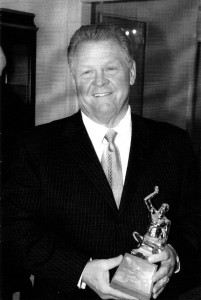This post is part of The Plank Center’s Legacies from Legends in PR Series that was begun in recognition of the 40th Anniversary of the Public Relations Student Society of America in 2007.
Former president and CEO of Hill and Knowlton/USA (1996-2001); founder of Hoog & Associates, a governmental affairs firm. Served five years as chief of staff for U.S. Senator Gary Hart. Member of the Advisory Board of the Smithsonian Institution’s Air and Space Museum and the Vietnam War Memorial. Received PRSA’s Gold Anvil Award (2004); named by PR Week as one of the 100 Most Influential Public Relations People of the 20th Century.
The leaders of tomorrow’s communications profession will have to help their clients and colleagues deal with tougher and tougher problems: ethical, legal, financial and social issues that go to the heart of corporate behavior and civic reputation. To earn trust, public relations executives must live up to the highest ideals of integrity and the most rigorous standard of truth-telling, living up to values epitomized by our profession’s pioneers–people like John Hill and Harold Burson.
Whether they work in agencies or “in-house” in corporate communications roles, practitioners should focus on providing strategic counsel based on solid research, a thorough understanding of corporate operations and public-spirited strategies. Offering candid counsel based on what really counts–a nuanced understanding of what the marketplace wants and substantive knowledge of what our society needs–is the surest way to win, and retain, public confidence.
Most importantly, the leaders of our profession must shun the dangerous “spin cycle” that has corrupted civic dialogue. “Spin” debases the entire process of communications as it seeks to divert public attention from fundamental challenges by resorting to quick-fix, skim-the-surface tactics that are intended to confuse people rather than clarify issues.
As long as public debate remains trapped in a shallow culture of spin, our profession will fail to gain the respect it deserves.
The culture of spin is destructive to our clients, the organizations we serve and our profession. A debased dialogue is not good for corporate credibility, and it undermines clients’ abilities to achieve their goals. It’s not good for consumers, who can’t tell where reliable information stops and spin begins. And it’s not good for our own long-term interests, because allowing public distrust to fester diminishes our credibility.
Tomorrow’s leaders, recognizing that the spin cycle is broken, should insist that the entire culture of spin be discarded.
Fending off substantive challenges to serious corporate concerns will always require candid communications that reflect a transparent and civic-minded corporate culture. Organizations win and retain public trust when they are values-driven organizations, with a humane corporate culture that is profit-oriented yet people-focused. We should remind our clients that the bedrock of corporate behavior should be the highest ethical values– a sense of high standards about how companies should treat their customers, shareholders and employees.
Communicators have an important role to play in meeting this challenge. They, perhaps more than anyone else in the corporate structure, should expunge the term “spin” from their lexicon. They should ensure that the highest value of all–allegiance to the truth–remains the central factor in corporate behavior.
Communicators are in a position to counsel CEOs and executives to elevate their vision. We can help them strengthen their corporate reputations–as well as do some good for society–by encouraging them to match their words with their deeds. We can exhort them, in the words of one great corporate leader, Michael Capellas, to “do the right thing, because it’s the right thing to do.” And in helping clients recognize that they must fulfill broad-minded civic responsibilities, we can live up to our own ambition to elevate public trust in our profession.
The future leaders of our profession must reaffirm our role as counselors of corporate behavior, keepers of corporate reputation and guardians of corporate integrity. It’s a tall order and it requires the highest professional standards, But I feel confident that our next generation of leaders will be up to the task.
More from Tom Hoog:
- Biography
- Plank Mentor Speech
- Plank Mentor Q&A Series
- Infographic: 10 Things to Know About Working in Public Affairs
